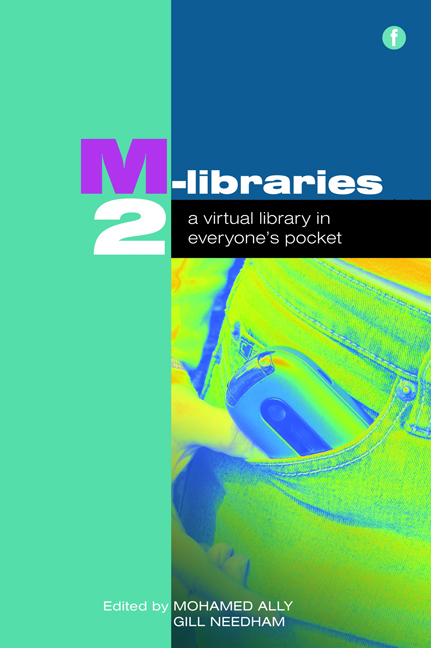Book contents
- Frontmatter
- Contents
- Acknowledgements
- Contributors
- Foreword
- Introduction
- PART 1 M-LIBRARIES: DEVELOPMENTS AROUND THE WORLD
- 1 Where books are few: the role of mobile phones in the developing world
- 2 Mobile technology in Indian libraries
- 3 Mobile technologies and their possibilities for the library, University of the South Pacific (USP)
- 4 M-library in an m-university: changing models in the Open University of Catalonia
- 5 Piloting mobile services at University of Houston Libraries
- PART 2 TECHNOLOGY IN M-LIBRARIES
- PART 3 APPLICATION OF M-LIBRARIES
- PART 4 M-LIBRARIES AND LEARNING
- PART 5 BUILDING THE EVIDENCE BASE FOR M-LIBRARIES
- Conclusion
- Index
3 - Mobile technologies and their possibilities for the library, University of the South Pacific (USP)
from PART 1 - M-LIBRARIES: DEVELOPMENTS AROUND THE WORLD
Published online by Cambridge University Press: 08 June 2018
- Frontmatter
- Contents
- Acknowledgements
- Contributors
- Foreword
- Introduction
- PART 1 M-LIBRARIES: DEVELOPMENTS AROUND THE WORLD
- 1 Where books are few: the role of mobile phones in the developing world
- 2 Mobile technology in Indian libraries
- 3 Mobile technologies and their possibilities for the library, University of the South Pacific (USP)
- 4 M-library in an m-university: changing models in the Open University of Catalonia
- 5 Piloting mobile services at University of Houston Libraries
- PART 2 TECHNOLOGY IN M-LIBRARIES
- PART 3 APPLICATION OF M-LIBRARIES
- PART 4 M-LIBRARIES AND LEARNING
- PART 5 BUILDING THE EVIDENCE BASE FOR M-LIBRARIES
- Conclusion
- Index
Summary
Introduction
This chapter discusses the way in which mobile technologies may be used to enhance services to users in the context of the Library at the University of the South Pacific (USP), based on a survey of library users at three campus libraries of Alafua (Samoa), Emalus (Vanuatu) and Laucala (Main Campus, Fiji). Background information is provided on the unique setting of the USP and its library network, and is followed by an analysis of the findings of the survey and its implications and challenges for the USP Library.
Setting the scene: the Pacific Islands and the University of the South Pacific
The University of the South Pacific is located in a region spread across 33 million square kilometres of ocean, an area more than three times the size of Europe. In contrast, the total land mass is about equal to the area of Denmark. The total population of the member countries of the USP region is approximately 1.4 million, with national populations ranging from 1,300 in Niue to more than 800,000 in Fiji.
There is great diversity in economic, social, cultural and political structures. The challenges of providing education in the multicultural and multilingual environment in which the USP consortium of countries operates, spanning five time zones and two different days, are very real. The university's distance and flexible learning programme, which commenced 40 years ago, has contributed immensely to tertiary education for the many who might otherwise never have had the opportunity to obtain tertiary qualifications. The possibilities of mobile technologies are thus immense in this academic environment.
The university, established in 1968, is one of two regional universities in the world, the other being the University of the West Indies. The USP is regarded as the leader in the Pacific Region in the provision of tertiary education. The university is owned and managed by the 12 Pacific countries of the Cook Islands, Fiji, Kiribati, Marshall Islands, Nauru, Niue, Samoa, Solomon Islands, Tokelau, Tonga, Tuvalu and Vanuatu. It has a physical presence in each country in the form of a campus, which includes a library. In some countries there are centres on the outer islands. Examples of these are Vava'u and Ha'apai in Tonga and Santo and Tanna in Vanuatu.
- Type
- Chapter
- Information
- M-Libraries 2A virtual library in everyone's pocket, pp. 27 - 34Publisher: FacetPrint publication year: 2010



